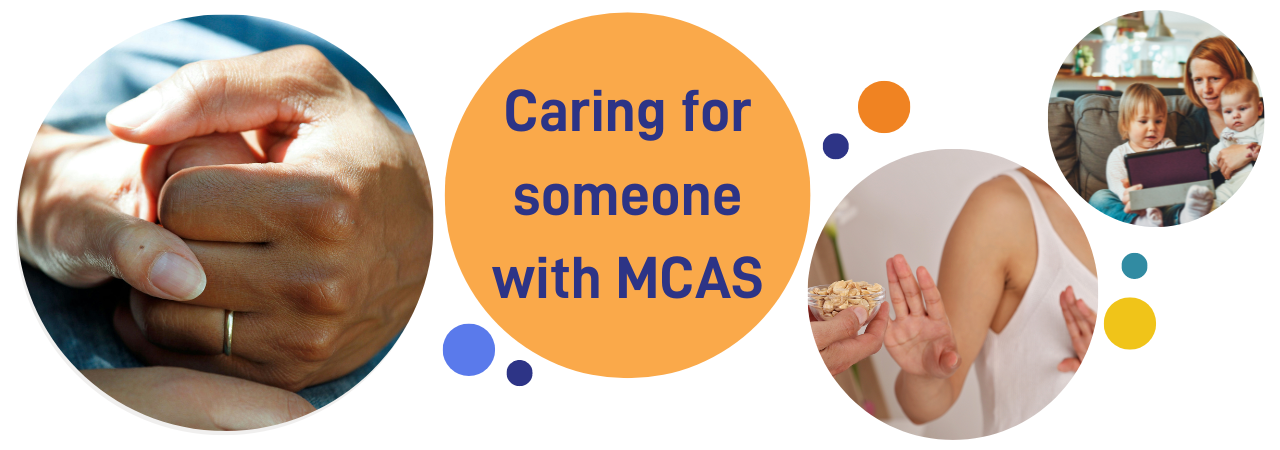

Caregivers
If you're caring for someone with MCAS, you're likely familiar with the complexities and challenges it can present. Living with MCAS can be unpredictable, with symptoms fluctuating in intensity and frequency. It can help to be prepared to adapt your caregiving approach as needed.
As a caregiver, you play a crucial role in supporting your loved one through their journey with MCAS. This page aims to provide you with information, resources, and support to navigate this journey more effectively.

Additional Support
If you are the parent or carer of a child living with MCAS or suspected MCAS, you may find our Children with MCAS page helpful. We also have a page for children, who want to learn about MCAS for themselves. It can be accessed here. If you are in the process of communicating your childs need to their school or are considering homeschooling your child, you may find our page on Homeschooling helpful.
You may also find it useful to read through our Advocacy page, which gives tips on how best to advocate for yourself and others and where you can look if you need further support.

Understanding MCAS
MCAS symptoms can vary widely from person to person and may include skin rashes, gastrointestinal issues, respiratory problems, cardiovascular symptoms, and more.
It's a complex condition that requires a multidisciplinary approach for management.
You may find it useful to read more about MCAS and famaliarise yourself with common triggers and symptoms.

Caring for yourself too
You may be able to support your loved one in a variety of ways, such as providing emotional or physical support, assisting with daily tasks, accompanying your loved one to medical appointments or advocating on their behalf. It is important to prioritise self-care as well, as caregiving can often be physically and emotionally demanding. You can not pour from an empty cup! All of our virtual sessions are not only open to those living with MCAS, but to caregivers too, so why not take advantage of our calming Rest and Unwind or Qigong sessions to help you recharge a little.

Navigating MCAS Together Guide
For more detailed information about supporting Loved-Ones with MCAS, download our free guide “Navigating MCAS Together” here.
The resource aims to equip you with the knowledge and tools to navigate the various challenges that may arise, while also offering practical advice to help you manage your own well-being. Inside, you'll find clear explanations of what MCAS is, tips on supporting someone with this condition, and insights into becoming a formal carer, if that becomes necessary.

Communication and support network
Communicating about your situation can help you both to cope. Encourage your loved one to share their symptoms, concerns, and needs with you. Likewise, communicate your own needs and limitations as a caregiver. Many of our community find it helpful to build a support network of family, friends, and healthcare professionals (where possible) who understand MCAS and can offer assistance when needed. Our online support groups can also be valuable resources for connecting with other caregivers and individuals living with MCAS.

Avoiding triggers
Helping your loved one to identify and avoid triggers that exacerbate their symptoms is a key part of supporting someone who is living with MCAS.
This may involve supporting dietary modifications, environmental adjustments, and stress management techniques. You may find our page on managing your environment useful. Creating a 'safe bubble' at home with as few triggers as possible is a great way to support someone with MCAS.

Physical support
If you are able to, you could offer to help your loved one with physical tasks, such as food shopping, meal preparation or house cleaning. During flares, those living with MCAS can sometimes feel extremely fatigued, so an offer of help may be gratefully received.
Those with MCAS may also appreciate support with medication management, including ordering and collecting prescriptions and organising them into pill-sorters.

You are not alone
Caring for someone with MCAS can be challenging, but you're not alone. There is a whole community of people facing similar journeys and together we can support each other through the tougher times.
Remember, taking care of yourself is essential too. Reach out for help if you need it, and don't hesitate to lean on your support network. For additional resources and support, please feel free to contact us.

Casper the Chameleon – Free Children's Book
Casper the Chameleon, written by our Director of Operations, Joy Mason, is available for free! This charming story is designed to support the wellbeing of children in the MCAS community.
To order your free copy, simply fill out this form.
"I started reading the Casper story to my 8 year old daughter, after she spotted the pack on the side and asked if she could look at it (such is the beautiful presentation). After the first few pages she went very quiet, and after a couple of minutes said, "Is this story about me?". It was the first time she had read a story about a person (albeit, a chameleon!) with MCAS, and she was quite moved. We could see she felt understood and seen, which in itself was very therapeutic. We have used the resources on and off since then, dipping into them when we need them and when new challenges arise. They have been an enormous help (almost equal to one on one psychological therapy, which we have also accessed), and we have since recommended them to others with similar health issues, as well as health professionals in the field of MCAS. Thank you for providing this invaluable resource. We are truly grateful."
Become a friend
Sign up to become a Friend of Mast Cell Action so we can keep you up to date on our progress and on how to get involved in our latest campaigns and initiatives.
Donate
Mast Cell Action relies entirely on the generosity of people like you. Please make a donation now and together we can make a difference to those affected by MCAS.







